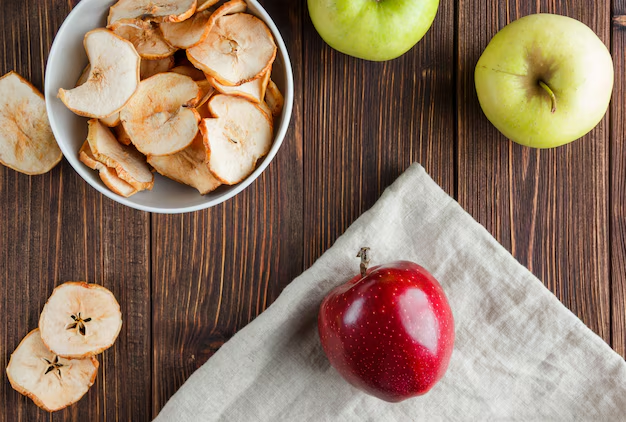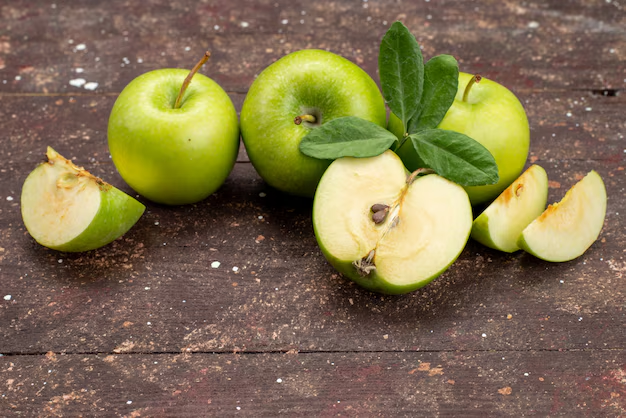Apples are one of the most beloved fruits in the United States. Known for their sweet and crisp flavor, they make a great snack for people of all ages. Beyond their taste, apples are packed with nutrients like vitamins, fiber, and antioxidants, making them a staple in many diets.
But if you’re watching your carbohydrate intake or following a low-carb diet, you might wonder: How many carbs are in an apple? Are apples suitable for keto or other low-carb eating plans? Let’s dive in to find out.
Apple Nutrition Overview
Let’s have a look at the nutritional value of apples.
Why Are Apples a Healthy Choice?
Apples are celebrated for their nutritional value. They are a rich source of dietary fiber, which supports digestion and promotes satiety. Apples also provide essential vitamins, including Vitamin C, which boosts your immune system, and small amounts of potassium, which supports heart health. Additionally, apples contain antioxidants like quercetin and flavonoids that help combat inflammation and oxidative stress.
General Nutritional Benefits
Here’s why apples are a go-to snack for health-conscious individuals:
- Fiber: An average apple contains 3-4 grams of fiber, vital for gut health.
- Vitamins: Apples are an excellent source of Vitamin C and contain smaller amounts of other essential nutrients.
- Low Calories: A medium apple typically has around 95 calories.
- Antioxidants: Apples provide plant compounds that promote cellular health and may reduce the risk of chronic diseases.
Carbs in Apples vs. Other Fruits
When compared to other fruits, apples hold a moderate carbohydrate content:
- Apple (medium, 150g): 25g of carbohydrates.
- Banana (medium, 118g): 27g of carbohydrates.
- Orange (medium, 131g): 15g of carbohydrates. While apples are higher in carbs than oranges, they are lower than bananas, making them a moderate option for those limiting carbs.
How Many Carbs Are in an Apple?
Here are mentioned the detailed values of carbohydrates present in apples of different varieties.

Carbs in a Medium Apple
A medium apple, weighing about 150 grams, contains approximately 25 grams of total carbohydrates. This includes around 19 grams of sugar and 4 grams of fiber, leaving 21 grams of net carbs (total carbs minus fiber).
For those tracking net carbs, such as keto dieters, this amount can add up quickly. However, it’s worth noting that the fiber content makes apples a more filling and nutritious choice compared to other sugary snacks.
Carbs in an Apple with Skin
The skin of an apple holds much of its fiber and nutrients. Eating an apple with the skin can:
- Increase fiber intake to 4 grams per medium apple.
- Slightly lower the glycemic impact due to the fiber slowing down sugar absorption.
If you peel your apple, you lose much of the fiber, reducing the health benefits and leaving behind mostly sugar and water.
Carbs in Apple Varieties
Different apple varieties have slightly different carb counts. For instance:
| Apple Variety | Total Carbs (per 150g) | Net Carbs |
| Granny Smith (Green) | 22g | 18g |
| Fuji (Red) | 27g | 23g |
| Gala (Red) | 25g | 21g |
Green apples like Granny Smith tend to be slightly lower in carbs and sugar, making them a better choice for low-carb diets.
To Read: Is Apple Juice Good for You?: A Detailed Guide
Are Apples Low-Carb?
Low-carb diets generally define “low-carb” foods as those with 5-10 grams of net carbs per serving. By this standard, a medium apple (with 21 grams of net carbs) does not qualify as low-carb.
However, apples can still fit into a reduced-carb lifestyle if consumed in moderation. For example:
- Use smaller portions (e.g., half an apple).
- Pair apples with protein or fat, such as peanut butter, to reduce their glycemic impact.
Analyzing Apples for Low-Carb Diets
While apples are not strictly low-carb, their high nutrient density and fiber content can make them a valuable part of a balanced diet. If you’re not following an ultra-low-carb plan like keto, apples can still be enjoyed occasionally.
Can You Eat Apples on Keto?
The ketogenic diet is a high-fat, low-carb eating plan that typically limits daily carb intake to 20-50 grams of net carbs. Given that a single medium apple has 21 grams of net carbs, it can take up a significant portion of your daily carb allowance.
For most keto dieters, apples are not ideal. However, in small quantities, such as a few thin slices, they may be enjoyed as a treat.
Alternatives to Apples for Keto Dieters
If you’re craving something sweet but need to stay within keto guidelines, here are some alternatives:
- Berries (e.g., raspberries, strawberries): Lower in carbs and rich in antioxidants.
- Avocados: A low-carb fruit high in healthy fats.
- Cucumber slices with lemon: A refreshing, keto-friendly option.
- Celery sticks with almond butter: Low-carb with a satisfying crunch.
Calories and Carbs in 1 Apple
Average Calorie Count Per Apple
Apples are a low-calorie snack, making them a favorite for those looking to maintain a healthy weight. A medium apple (about 150 grams) contains approximately 95 calories. This calorie count is primarily due to its natural sugars and carbohydrate content.
The sweetness of an apple comes from its naturally occurring fructose, which provides energy while keeping calories relatively low. The water and fiber in apples also contribute to their low calorie density.
Relation Between Calories and Carb Content
The carbohydrates in apples, which amount to about 25 grams in a medium apple, are the main source of their calories. Here’s a breakdown:
- 4 grams of fiber: Provides bulk and supports digestion.
- 19 grams of sugar: Natural sugars like fructose, glucose, and sucrose.
- 2 grams of other carbs: Starches and complex carbs.
While the carbs in apples contribute to their energy content, the high fiber and water content keep you feeling full and satisfied.
Health Benefits of Eating Apples Despite Their Carbs
Here are mentioned the detailed benefits of apples.

Fiber for Gut Health
Apples are an excellent source of dietary fiber. A medium apple contains about 4 grams of fiber, which is crucial for maintaining healthy digestion. Fiber helps prevent constipation, promotes a healthy gut microbiome, and keeps you feeling fuller for longer.
Role in Managing Blood Sugar Levels
Despite their natural sugars, apples have a low glycemic index (GI) of about 36. This means they cause a gradual rise in blood sugar, making them suitable for people managing blood sugar levels. The fiber in apples slows sugar absorption, preventing blood sugar spikes.
Vitamins and Antioxidants for Overall Health
Apples are rich in Vitamin C, an antioxidant that boosts immunity and skin health. They also contain polyphenols, plant compounds that protect against inflammation and oxidative damage. These nutrients make apples a powerhouse for overall health, regardless of their carbohydrate content.
Apples vs. Other Fruits: Which Is Lower in Carbs?
When it comes to carb content, apples are considered moderate compared to other fruits. Here’s how they stack up:
- Medium Apple (150g): 25g total carbs
- Medium Banana (118g): 27g total carbs
- Medium Orange (131g): 15g total carbs
- 1 Cup of Raspberries (123g): 14g total carbs
Why Some Fruits Are Better for Low-Carb Diets?
Berries, such as raspberries, strawberries, and blackberries, are lower in carbs and higher in fiber compared to apples or bananas. Their low glycemic impact makes them a better choice for low-carb or ketogenic diets.
Apples, while higher in carbs, still offer significant health benefits. For those on a strict low-carb diet, opting for smaller apple portions or lower-carb fruits like berries might be a better choice.
Tips for Including Apples in a Low-Carb Diet
Must keep the below-mentioned tips in mind when including apples in a low-carb diet.
Portion Control
One of the simplest ways to enjoy apples on a low-carb diet is by controlling your portion size. Instead of eating a whole apple, consider slicing it into halves or quarters. A small apple (100 grams) contains about 19 grams of total carbs, which is easier to manage on a reduced-carb diet.
Pairing Apples with High-Protein or High-Fat Foods
Combining apples with protein or healthy fats can balance their glycemic impact. Try these pairings:
- Apple slices with peanut butter: Adds healthy fats and protein for sustained energy.
- Apple wedges with cheese: Provides a savory twist while slowing carb digestion.
- Apple chunks with Greek yogurt: Enhances satiety and delivers a nutrient-dense snack.
These combinations not only taste great but also help you stay within your carb limits.
FAQs
How many carbs are in 100 grams of apple?
A 100-gram serving of apple contains about 14 grams of total carbs. This includes 3 grams of fiber and 11 grams of sugar, leaving approximately 11 grams of net carbs.
Do green apples have fewer carbs than red apples?
Yes, green apples like Granny Smith typically have fewer carbs than red varieties. A medium green apple contains about 22 grams of carbs, compared to 25 grams in a red apple.
Are apples good for weight loss on a low-carb diet?
Yes, apples can aid in weight loss due to their low calorie and high fiber content. However, for strict low-carb diets, smaller portions or pairing with protein is recommended.
What’s the glycemic index of an apple?
Apples have a low glycemic index of 36, meaning they cause a slow and steady rise in blood sugar levels. This makes them a good choice for balanced diets.
Can I eat apples daily on a low-carb diet?
Yes, but in moderation. Limit your portion to a small apple or half of a medium one and pair it with protein or fat to keep your carb intake in check.
Conclusion
Apples are a delicious, nutrient-packed fruit that provides essential vitamins, fiber, and antioxidants. While not inherently low-carb, they can still fit into a reduced-carb lifestyle when consumed in moderation. By controlling portions and pairing apples with healthy fats or proteins, you can enjoy their benefits without exceeding your carb goals. Now that you know how many carbs are in an apple, you can make informed choices for your diet while enjoying this classic fruit.

